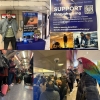Is AI failing?

While AI tools can efficiently screen candidates, they are not yet capable of fully assessing soft skills, problem-solving abilities, and fundamental competencies. As a result, Google has decided to include at least one in-person interview for all candidates, even in technical roles, to ensure they truly meet the required standards.
AI can help with initial screening; its judgment can be flawed. It may overlook subtle but crucial human qualities such as communication, creativity, collaboration, and adaptability: traits that are often vital for long-term success within the company. The decision to reintroduce in-person interviews also reflects feedback from Google employees who voiced concerns about an overreliance on AI-driven evaluations and virtual assessments. They argued that personal interactions remain essential to accurately gauge a candidate's potential.
This move represents a hybrid approach to recruitment, blending technology’s efficiency with human judgment. By combining AI-driven screening with face-to-face evaluation, Google aims to maintain both speed and accuracy in hiring, ensuring the right talent is selected for roles at all levels.
Other companies may follow Google’s lead, rethinking purely automated recruitment processes and reinstating in-person interactions to prevent mis-hires and ensure cultural fit. For job seekers, this development underscores the importance of preparing not only for technical assessments but also for real-world interactions where interpersonal skills, confidence, and presence are evaluated.
Overall, the emphasis on human judgment in hiring highlights a growing recognition: AI is a useful tool, but it cannot fully replace the nuanced evaluation that only human interactions provide.




